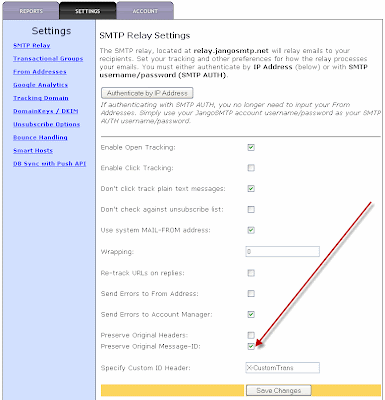
The JangoSMTP system Message-ID looks like:
Message-ID: <254970262215471@jngomktg.net>
It's a unique number followed by @jngomktg.net. Some JangoSMTP users have asked that the original Message-ID of the message transmitted through the relay be used instead of being overwritten by the JangoSMTP system Message-ID. For example, if you send an email using Mozilla Thunderbird, the Thunderbird-generated Message-ID looks like:
Message-ID: <4DB66014.1070804@silicomm.com>
In Thunderbird's case, the Message-ID contains a unique string of alphanumeric characters and uses the domain of the receiving email address. If the Preserve Message-ID box is checked, this will also be the Message-ID in the final email delivered to the recipient. If unchecked, this Message-ID will be replaced by the JangoSMTP system generated Message-ID.
Calling the API directly
If calling the transactional email API directly via the SendTransactionalEmail method, you can specify a custom Message-ID in the Options parameter using the CustomHeaders attribute:
Options:
OpenTrack=True,ClickTrack=False,NoClickTrackText=True,SkipUnsubCheck=False,SkipBounceCheck=False,UseSystemMailFrom=True,CustomHeaders=Message-ID:<4DB65FC8.8050705@silicomm.com>
Why is this useful?
Allowing you full control of the Message-ID header value is useful if you have a custom reply management system in place, such that responses and bounces can be tagged with their original Message-ID.
